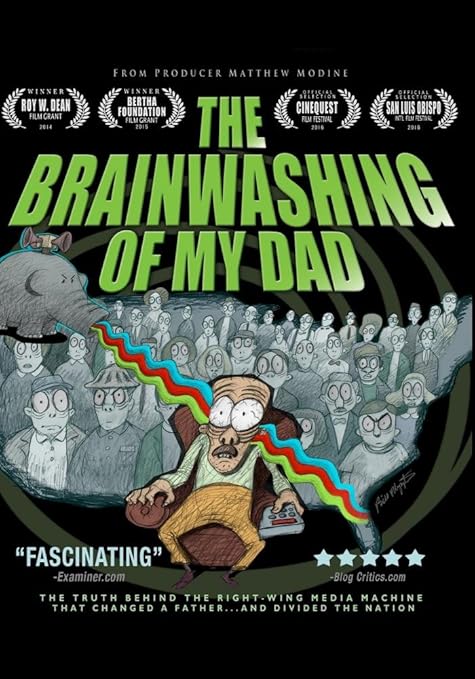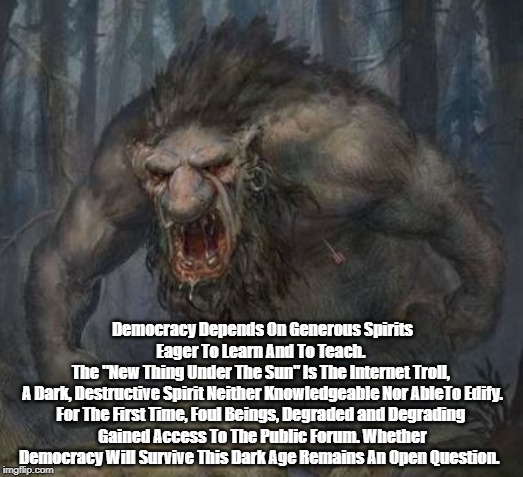Netflix Documentary "The Great Hack" Reveals The Inner Workings Of "1984" Today https://newsfrombarbaria.blogspot.com/2021/04/netflix-documentary-great-hack-reveals.html
“Change happens by listening and then starting a dialogue with the people who are doing something you don’t believe is right.” - Jane Goodall
“In true dialogue, both sides are willing to change.” - Thich Nhat Hanh
“The most pressing environmental problem we face today is not climate change. Rather it is pollution in the public square, where a smog of adversarial rhetoric, propaganda and polarization stifles discussion and debate, creating resistance to change and thwarting our ability to solve our collective problems.” - James Hoggan, I’m Right and You’re an Idiot- 2nd Edition: The Toxic State of Public Discourse and How to Clean it Up
Hello Family and Friends!
Our topic for this coming Wednesday April 21 is Dialogue and Democracy. As we start thinking creatively about this, it is important to keep in mind the basic issue of human freedom and dignity.
Human freedom and dignity are always tenuous. Many people are ready to abandon their freedom. That was true in Germany a hundred years ago and it is true in North America today. Totalitarianism was successful because it solved human problems. The cost was enormous, however. The price they paid was their humanity.
Today, as Robert Reich has emphasized, wealth and political power are becoming more and more concentrated in the hands of the elite. As a consequence, we are faced with a danger somewhat different from the familiar forms of totalitarianism. The threat to human freedom and dignity in our own society today is insidious and is well on its way to victory. The burnout experienced among millennials is one sign of its ascendency and of what it will cost if it continues unchecked.
In her monumental 2019 book The Age of Surveillance Capitalism Shoshana Zuboff provides a contemporary wake-up call for everyone who thinks that human freedom and dignity are essential. https://www.youtube.com/watch?
Her work has received many awards and has been featured in a short BBC Ideas video https://www.youtube.com/watch?
Her book is more than 500 pages, beautifully written, with transformative insights in every one of its (eighteen) chapters. I provide a synopsis of the book herewith. It is only a glimpse. Please read the book.
Here is the Zoom link for Wednesday April 21. The event starts at 6:30 PM Calgary time.
Topic: Humainologie creative dialogue
Time: April 21, 2021 06:30 PM Mountain Time (US and Canada)
Every week on Wed, until Apr 28, 2021, 9 occurrence(s)
Join Zoom Meeting
Arthur
Book: (Shoshana Zuboff) The Age of Surveillance Capitalism: The Fight for a Human Future at the New Frontier of Power (2019)
This book was a New York Times Notable Book of the Year, a Time Must-Read Book of 2019, a Financial Times Best Book of the Year, and an international bestseller. Shoshana Zuboff is the author of two previous books that arose from her search for answers to the questions that also gave rise to this one. “Dr. Zuboff is the Charles Edward Wilson Professor Emerita at Harvard Business School and Faculty Associate at the Berkman Center for Internet and Society at Harvard Law School.”
She is concerned with issues that have worried a lot of us, including the possibility that our human future may be relinquished to robots and computers. “2001: A Space Odyssey” was a 1968 movie in which “Hal,” the computer, decides that the main character, a human, is expendable. Decisions about our lives should be under our control. China today is the kind of society Shoshana Zuboff wants us to avoid. In a section entitled “The China Syndrome” (in Chapter 13) Zuboff quotes author Amy Hawkins: “To be Chinese today is to live in a society of distrust, where every opportunity is a potential con and every act of generosity a risk of exploitation.” In another section of that same chapter, “A Fork in the Road,” she describes the two alternative futures we must be aware of, one in which information technology is used in ways that both support human needs and are “compatible with a flourishing democratic social order.” The other path leads toward the China Syndrome.
The book opens with a question she was asked in 1981, with “urgency and frustration” in the voice of the young paper mill manager who posed the question: “Are we all going to be working for a smart machine, or will we have smart people around the machine?” Tracing the remarkable history of how we arrived where we are, with plenty of warning signs along the way, she describes the danger we are currently facing and the choices this crisis has forced upon us.
Surveillance capitalists have used the surveillance capabilities of information technology (which the author refers to as “Big Other,” an allusion to “Big Brother” in George Orwell’s novel 1984, published in 1949 and depicting a dystopian future) to “read” our private lives and preferences; and then use that information to maximize their profits. “That surveillance capitalism is a logic in action and not a technology is a vital point because surveillance capitalists want us to think that their practices are inevitable expressions of the technologies they employ.” It is not search engines but surveillance capitalism that keeps records of our search histories and uses those records for ulterior purposes. Casinos are designed to foster addiction to gambling. Young adults are addicted to Facebook. Technology is used to “combat terrorism” but also by police departments to track messages exchanged by activists and protestors. The China Syndrome is emerging right here where we live.
The history extends back more than two centuries, when “modernity” began to replace the culture and society of the traditional village. The movie “Fiddler on the Roof,” gives a glimpse of some of these birth pains of “modernity.” As young adults abandoned villages and became factory workers, a process of “individualization” was set in motion. The refuge of village life faded, and the refugees set out toward an uncertain and ever-changing future, more on their own than their ancestors had ever been. The industrial revolution led by stages to the Gilded Age, when the mass of workers became the means that enabled the luxury and power of the wealthy elite. The purpose of the worker was financial profit for the capitalist. In the Age of Surveillance Capitalism, something very similar is emerging. Some have called it neo-feudalism. Whatever you call it, we are now in the position that the workers were in during the Gilded Age. It is happening. It will continue unless we turn it around.
In his influential book Capital in the Twenty-First Century (2013) the French economist Thomas Piketty had compiled data showing that the rate of return on capital tends to exceed the rate of economic growth. That’s a problem in itself, and the danger is increased by the fact that the return is being concentrated, along with political power in fewer and fewer hands. Piketty’s book heightened awareness of the crisis of capitalism. Robert Reich’s book Saving Capitalism carried a related message. Shoshana Zuboff writes, “A précis of Piketty’s extensive research may be stated simply: capitalism should not be eaten raw. Capitalism, like sausage, is meant to be cooked by a democratic society and its institutions because raw capitalism is antisocial.”
In Chapter 18, “A Coup from Above,” she notes that surveillance capitalists demand freedom from constraint. They must have freedom to launch whatever they want, and they must have freedom from any form of law or regulation. Theorists of capitalism have insisted that the market is unknowable and that market actors must have freedom of action. Note the necessary association of ignorance and freedom. Friedrich Hayek had contributed to this thesis, insisting that the market worked better than democracy because the market enabled a “coordinated utilization of resources based on equally divided knowledge.” However, the order that has emerged is a massive asymmetry in the control of knowledge in the hands of “a narrow priesthood of privately employed computational specialists, their privately owned machines, and the economic interests for whose sake they learn.” As this evolves, guided by cleverness rather than wisdom, they envision a future of wearable devices that gather information on everyone everywhere all the time.
What is happening “unravels the neoliberal justification for the …triumph of raw capitalism. It suggests that surveillance capitalists mastered the rhetoric and political genius of the neoliberal ideological defense while pursuing a novel logic of accumulation that belies the most fundamental postulates of the capitalist worldview.” They have changed the rules of the game on us. “This cycle will be broken only when we acknowledge as citizens, as societies, and indeed as a civilization that surveillance capitalists know too much to qualify for freedom.”
We must restore countervailing power. Zuboff quotes Piketty: “If we are to regain control of capital, we must bet everything on democracy….” The ball is in our court. We the people have played this game before and won. The Gilded Age, for example, with its immense concentration of wealth and power “succeeded in teaching people how they did not want to live.” And as a result, we the people brought the Gilded Age to an end. The foundations were laid for the New Deal and the buoyant prosperity of the middle class in the 1950s. We did it. And there are signs that we are beginning to do it again, not only in the West but also in the East. Using as an example the ultimate collapse of totalitarianism in the Soviet Union, Shoshana Zuboff concludes the book with this statement: “The Berlin Wall fell for many reasons, but above all it was because the people of East Berlin said, ‘No more!’ We too can be the authors of many ‘great and beautiful’ new facts that reclaim the digital future as humanity’s home. No more! Let this be our declaration.”
Compendium Of Trump Videos That Reveal His Arrogance, Inhumanity, Stupidity And Cruelty
"Pardon Him, Theodotus; He Is A Barbarian And Thinks That The Customs Of His Tribe And Island Are The Laws Of Nature." George Bernard Shaw On The Nature Of Personal Stupidity And Social Stupefaction
The Insuperable Stupidity-Perversity-Ignorance Of Diehard Trump Supporters






No comments:
Post a Comment